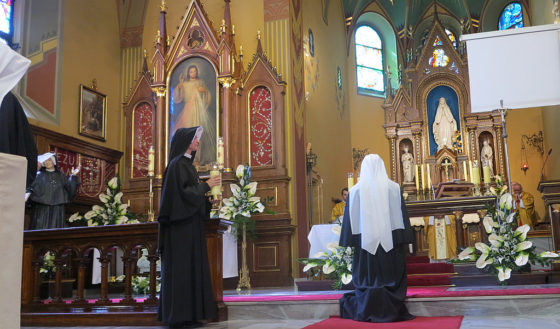“O my Jesus, each of Your saints reflects one of Your virtues in himself; I want to reflect Your Heart, full of compassion and mercy, I want to sing Its praise. Let Your mercy be impressed like a seal on my heart and soul, O Jesus, and that shall be my badge in this life and in the life to come. To sing the praise of Your mercy is the exclusive task of my life” (Diary, 1242).
The ceremony of taking the veil, during which the postulant receives a new religious name, begins the basic period of religious formation – the novitiate. In our Congregation, it lasts two years, with novices spending their first year in the community of the novitiate house because the first year is dedicated to intense spiritual formation. The period of the novitiate is used to build an ever deeper relationship with Jesus the Merciful so that the sister, following in His footsteps, will be able to offer her life as a gift to “God rich in mercy”, who is to be her only Beloved.
The superior of the novitiate, who directs the formation process, guides the young sisters into the life totally dedicated to Jesus according to the evangelical counsels, and in accordance with the charism of the Congregation. She acquaints them with the development of the spiritual life, prayer and asceticism; with the Church’s liturgy, and with the spirituality and apostolate of the Congregation. Novices are to become thoroughly acquainted with the way of life of the Congregation, with its participation in the life and mission of Christ; and to learn trust in the mercy of God, as well as obedience to the will of God in imitation of Mary Mother of Mercy, who utters her fiat to God in perfect faith. Keeping their eyes fixed on the example of Merciful Jesus, novices try to ensure that the spirit of mercy pervades their whole life, and in particular their relationships among the sisters and their interpersonal contacts.
In the second year of the novitiate, the novice sisters undertake apostolic practices in the houses of the Congregation so that, together with the professed sisters, they can become more fully involved in the life of religious communities and in various works of mercy. The sisters spend the final months of their novitiate in the novitiate community undergoing intense preparation for making their first religious profession.
If the novice has confirmed herself in the desire to give her life to God and if the Congregation has the same discernment, then she can take the vows of chastity, poverty and obedience according to the constitutions of the Congregation and its charism of manifesting God’s mercy in the world.
Translated by Orest Pawlak
















